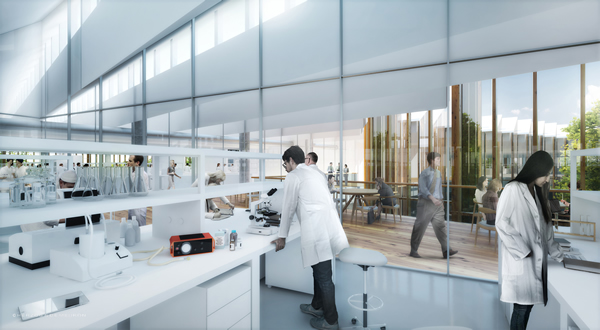MedImmune, the global biologics research and development arm of AstraZeneca, and the University of Sheffield in the UK announced in June that they have entered into a multi-project research collaboration to generate breakthrough research in cell factory technology, the process by which living cells can be controlled and manipulated to make specific proteins with therapeutic benefits.
As part of the five-year collaboration, MedImmune will provide funding and in-kind contributions to support University of Sheffield post-doctoral and doctoral research projects to address key challenges in cell engineering. The aim is to produce tools to ensure that manufacturing success is “designed in” from a much earlier stage than occurs with current screening-based strategies, to improve the development and production of biologic medicines. The collaboration will focus on harnessing expertise from both MedImmune and the world-leading group in the University’s Advanced Biomanufacturing Centre to advance research specifically in mammalian cell factories.
Researchers from MedImmune and the University will exchange research materials and move easily between sites and state-of-the-art facilities and will work closely as an integrated team. A Joint Steering Committee (JSC) comprised of equal members from both institutions will select the research projects and may choose to seek additional grant funding from other sources to generate further high quality, collaborative work.

“We are pleased to enter into this strategic collaboration with the University of Sheffield to generate transformative cell factory tools that can potentially improve the way new therapies are delivered to patients,” said Gail Wasserman, senior vice president, Biopharmaceutical Development, MedImmune. “This multi-year commitment provides MedImmune with a strong partner in cell factory research and may allow select complex proteins to be more rapidly and effectively manufactured to produce life-changing therapies.”
“This partnership will enable us to significantly advance cell engineering technology able to speed the development of MedImmune’s new biopharmaceutical medicines,” said Professor David James, director of the Advanced Biomanufacturing Centre at the University of Sheffield. “Together we will design and create new cell factories specifically fit for purpose that can overcome natural limitations in cellular manufacturing performance.”
Lab Collaboration
The collaboration builds on previous research collaborations that MedImmune has recently entered into in biopharmaceutical development, including collaborations with The University of Cambridge’s Department of Chemical Engineering and Biotechnology, the University of Manchester and the U.S. Department of Commerce’s National Institute of Standards and Technology (NIST).
AstraZeneca and the University of Cambridge on June 30 announced three new joint schemes to support more than 90 PhD scholarships and eight clinical lectureships over the next five years spanning translational science, basic and clinical research. “The programs reflect AstraZeneca’s long term commitment to the science base in the UK and the shared dedication of the company and the University of Cambridge to developing the next generation of world-class scientists,” said a company statement. The schemes are as follows:
- AstraZeneca will fund a minimum of nine scholarships annually, divided across the departments of chemistry, biochemistry and pharmacology, with each running for a four-year period. AstraZeneca will also have the possibility of enrolling up to two of its employees annually as PhD students in one or more of the departments.
- MedImmune, together with the School of Clinical Medicine and the School of the Biological Sciences at the University of Cambridge, has established a collaborative PhD programwhich will focus on both clinical and translational research, supporting up to six scholarships annually, with students spending equal amounts of time at the University and MedImmune’s laboratories in Cambridge.
- AstraZeneca and MedImmune will fund one PhD scholarship and two academic clinical lectureships annually for four years under the University’s new Experimental Medicine Initiative. Each post will run for up to four years with the opportunity for placements within AstraZeneca or MedImmune.
All three schemes begin this fall. Students will be appointed by the University of Cambridge and will be supported by an academic supervisor from the University and an industrial supervisor from AstraZeneca or MedImmune to ensure that basic scientific research is closely aligned with real-world challenges of drug discovery and development.
“For the UK to remain at the cutting edge of life science, it’s essential that we continue to invest in developing the next generation of scientists who can combine outstanding basic research with an understanding of its translation into new medicines for patients,” said Mene Pangalos, executive vice president, Innovative Medicines and Early Development at AstraZeneca. “These new scholarships are a great way to train young translational scientists and reinforce the shared commitment of AstraZeneca and the University of Cambridge to create an open, collaborative research environment where investigators can work side by side to push the boundaries of science.”
“The new PhD schemes further strengthen the partnership between AstraZeneca and the University,” said Professor Sir Leszek Borysiewicz, vice-chancellor at the University of Cambridge, “supporting the development of a cadre of Cambridge scientists who can continue to compete with the very best in the world.”

